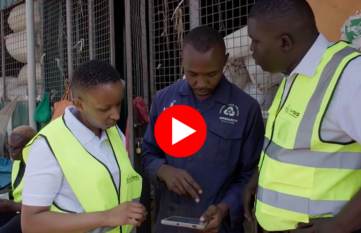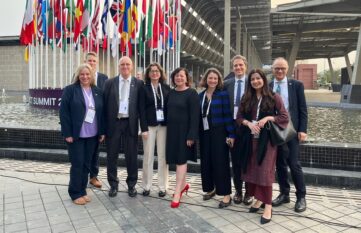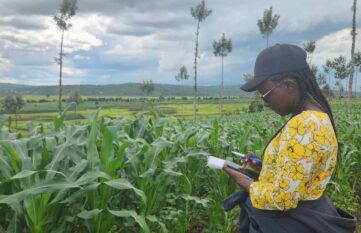Code for community: Open source AI sparks business and impact

From Kenya to India, entrepreneurs are using artificial intelligence (AI) to provide agricultural advice, empower women to claim their rights, and improve public services—making data and models openly available. How can these companies drive local innovation and create social impact while remaining economically viable? A mentorship programme by Villgro Africa and ‘FAIR Forward – Artificial Intelligence for All’ is supporting them in refining sustainable business models and growing a global network of open source AI innovators.
In the fast-evolving world of AI, companies and organisations are benefiting from open source AI to build services that address societal challenges. Farmers in Kenya receive advice on climate-resilient practices, while women in the Democratic Republic of Congo are gaining knowledge on land ownership rights. By using, developing, and sharing open data, models, and tools, they are proving that AI can be collaborative. But how can they balance social impact with financial stability?
One of these AI innovators is the Nairobi-based Local Development Research Institute (LDRI). Leonida Mutuku, who leads the AI development department, explains that open source language data is used to ensure farmers can interact with their tools in Kiswahili and other local languages. Their early-warning system provides smallholder farmers in Kenya with climate-resilient agricultural advice.

© LDRI
Some of our work—like crop imagery, yield data or a base AI model for crop identification—we give back as open source assets that the community can use for local innovation.
Leonida Mutuku, Head of AI development, Local Development Research Institute (LDRI)
Building viable business models with open source AI
The challenge of combining open source principles with financial stability is a concern that LDRI shares with many other organisations. To support them, Villgro Africa and FAIR Forward—Artificial Intelligence for All launched a six-month mentorship programme in which LDRI took part alongside seven other entrepreneurs. Participants received tailored support through two means:
- One-on-one mentoring to refine market fit and revenue-making strategies
- Peer learning workshops on topics such as open source business models, legal compliance considerations, or marketing
Each organisation left with a stronger, more sustainable business model as a stepping stone towards financially viable operations involving open source AI elements.
In response to challenges that cotton farmers in India face with pests, Wadhwani AI developed the CottonAce application. Using image recognition, it identifies specific cotton pests and provides scientific advice, reducing a process that once took a few days to just minutes. With support from the mentorship programme, J.P.’s team promoted the app to thousands of farmers across India, thereby helping them to secure their livelihoods.

© Wadhwani AI
Defining business metrics and working with our mentors gave us a clearer picture of the impact of our work on various stakeholders in the cotton value chain and helped us strengthen our strategy.
J.P. Tripathi, Director of Agriculture Programmes, Wadhwani AI
A growing network of open source AI entrepreneurs
The mentorship programme has brought together a vibrant network of open source AI innovators in Africa and Asia. Besides LDRI and Wadhwani AI, these entrepreneurs are:
- Core23Lab (Democratic Republic of Congo): In a context where land is predominantly controlled by men, the voice-enabled mobile service ‘Haki des femmes’ educates women in Kiswahili about land ownership rights. Core23Lab is thus contributing to a societal shift towards women’s role and rights in land ownership.
- Digital Umuganda (Rwanda): As one of the key drivers behind the Kinyarwanda dataset on Mozilla Common Voice, they offer language technology as infrastructure for building inclusive, AI-enhanced services, providing data collection services and models for speech recognition, speech synthesis, and machine translation.
- Gram Vaani (India): Voice-based applications in local languages that serve farmers and communities with advisory services on customer grievance redressal vis-à-vis public administration and information on homestead gardens.
- M-Omulimisa (Uganda): A localised version of Croppie AI, an AI-enhanced agricultural tool, that helps farmers to forecast coffee cherry yields based on plant health and cherry count.
- Tech Innovators Network (THiNK) (Kenya): AI-enhanced chatbots, built on open source language datasets and chatbot frameworks, support public sector institutions such as the Office of the Data Protection Commissioner in Kiswahili.
The work of Core23Labs, THiNK and Digital Umuganda was supported by Mozilla Common Voice, funded by the Gates Foundation, to build datasets and AI-enhanced tools in Kiswahili and its regional dialects. They were guided by FAIR Forward in developing viable business models.
Open source AI as basis for collaborative innovation
The advantage of open source AI lies in the shared assets that can be re-used and developed collectively. This openness fosters trust and reduces risks in AI systems due to the heightened scrutiny it allows. As such, open source AI lowers the barriers for entrepreneurs to develop AI systems that both generate revenue and also give back to the open source community.
However, challenges remain: limited access to computing resources and training in AI and data science in many global majority countries restrict equal participation. Moreover, open source access to and equitable benefit from AI systems needs careful consideration to avoid exploitation from open source contributors.
Nevertheless, organisations such as LDRI continue to build their services alongside the communities they serve.


© LDRI
Our trustful relationship with farmers and their benefits are close to our heart. That is why we are carefully considering how to offer premium services that allow us to create revenue whilst keeping our services free-to-access for them. Anything we do, we co-create with them as our partners. That is what responsible AI looks like for us.
Leonida Mutuku, Head of AI development, Local Development Research Institute (LDRI)
More information: Toolkit and webinar
- Mentorship Toolkit: Practical guide to build your own mentorship programme for open source AI entrepreneurs (incl. links to all training materials). The Villgro Africa team has continuously improved the mentorship methodology, integrating lessons from two cohorts.
- Webinar: Lessons from the mentorship programme and insights into how open source AI is transforming the business landscape and driving innovation across industries.




